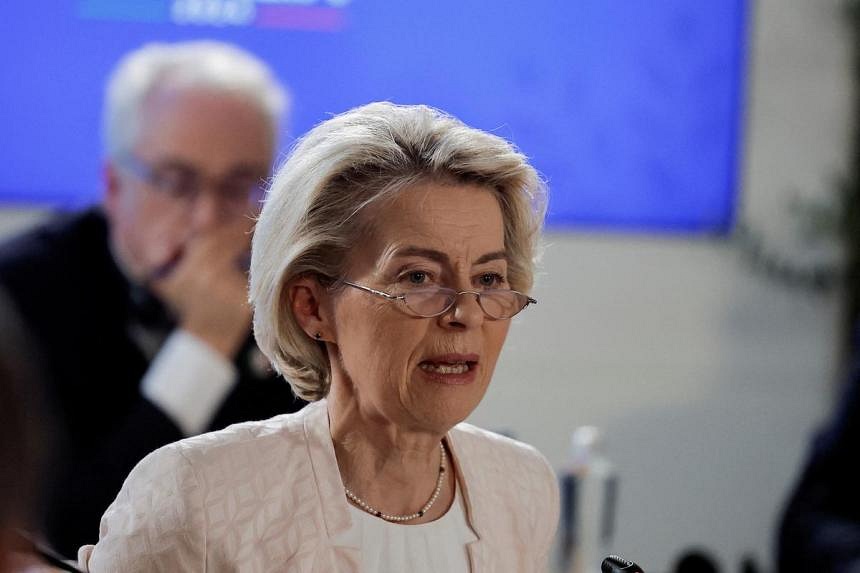Top jobs on EU leaders’ menu, with von der Leyen in pole position

BRUSSELS – EU leaders gather on June 17 in Brussels to thrash out over dinner how to distribute the bloc’s top jobs, with Dr Ursula von der Leyen seemingly on track for a second term heading the European Commission.
Far-right gains in EU-wide elections, which triggered snap polls and political upheaval in France, appear to have focused minds around the positions at the bloc’s helm – negotiated among its members with an eye to geographic and political balance.
While leaders are expected to formally make their choices known at a June 27 to28 summit, a consensus already appears to be emerging.
“I believe things can move forward efficiently. At least that is my wish, and that will be my frame of mind on Monday,” French President Emmanuel Macron said at the end of the G7 summit last week in Italy, where he held talks with both German Chancellor Olaf Scholz and Dr von der Leyen.
Mr Scholz sent a similar message, telling ARD television that “a political majority is coming together” and that “things could be decided fast”.
The meeting on June 17 kicks off at 6pm local time in Dr von der Leyen’s presence – but the commission chief will leave before dinner, when leaders are to tackle the matter of top jobs.
Dr Von der Leyen’s European People’s Party (EPP) was the biggest winner in the June 6 to 9 EU Parliament elections, cementing the German conservative’s bid for five more years helming the executive body of the world’s second-largest economy.
The other roles to be decided are president of the European Council, which represents member states and is currently filled by Mr Charles Michel; and the “high representative” – the EU’s foreign policy chief – currently Mr Josep Borrell.
The second group in parliament, the Socialists and Democrats (S&D), have their sights set on the Council position, with Mr Antonio Costa, Portugal’s 62-year-old former prime minister, seen as the front-runner.
Mr Costa resigned after becoming embroiled in a corruption probe, but the case has since appeared to come apart, and diplomats suggest it is unlikely to stand in his way.
The high representative position could go to Ms Kaja Kallas, 46, current premier of Estonia and an outspoken Kremlin critic – in a strong signal to the EU’s east.
A fourth job is in play: that of European Parliament president, decided by the legislature, not the leaders. It is likely to return the incumbent, the EPP’s Roberta Metsola, 45, for another two-and-a-half-year term.
Macron and Scholz weakened
To secure the nod from EU leaders, Dr von der Leyen, 65, needs support from a “qualified majority” of 15 out of 27 countries, covering at least 65 per cent of the bloc’s population.
A dozen leaders come from her EPP political grouping – but she also needs to win over Mr Macron, from the centrist Renew Europe group, and Mr Scholz of the S&D.
Both leaders of the French-German axis at the heart of the European Union have emerged weakened after being beaten by far-right parties in the EU Parliament elections.
Most spectacularly, in France the National Rally (RN) of Marine Le Pen trounced the party of the president, who now faces the prospect of the RN’s leader – the 28-year-old TikTok-friendly Jordan Bardella – potentially becoming his prime minister.
Related
ForexLive European FX news wrap: Euro stays buoyed, markets wait…
Headlines:Markets:EUR leads, AUD lags on the dayEuropean equities lower; S&P 500 futures up 0.1%US 10-year yields down 2.7 bps to 4.255%Gold up 0.4% to $2,9
European shares fall as tariff uncertainties weigh; US jobs data…
(Reuters) - European shares fell on Friday as frequent shifts in U.S. trade policy throughout the week resulted in risk aversion, while focus remained on th
US economy added 151,000 new jobs in February; Euro on…
US jobs report releasedNEWSFLASH: Hiring across the US economy picked up slightly at the start of Donald Trump’s second term in office.The US economy added 15












